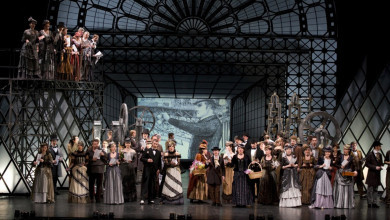SYNOPSIS
Prologue
Hoffmann is
returning home following a wild night out. He is in love with
a beautiful girl he does not know who lives in the house across
the road and whom he calls Stella.
In Hoffmann’s feverish state two
alter egos come to life: the experience-rich, mature and rational Lindorf
and the young poet Nicklausse. Lindorf and Nicklausse try various means to
tease the amorous Hoffmann. They make fun of him, pretending that bills for
the apartment are the love letters that Hoffmann dreams of receiving
from the mysterious stranger.
Students assemble in Hoffmann’s
room – in their eyes he is a literary giant and a great
authority. At the height of the friendly meeting Hoffmann begins
to relate the story of his love, as it were in order to comprehend who
the stranger, his beloved, actually is. Hoffmann draws his guests into his
tale of three love stories.
First Love. Olympia
With Coppelius’ assistance,
Spalanzani the inventor has created Olympia, an amazingly lifelike
illusion. Having barely had a glimpse of Olympia, Hoffmann immediately
falls in love with her. Wishing to become acquainted with the girl, he
presents himself as a man of science. Coppelius appears, having come to
Spalanzani for the money owed him for the work he did. In order to get
rid of CoppeliusSpalanzani gives him a check from a bank that has
collapsed. Coppelius sells Hoffmann a pair of special glasses. When he
wears them he finds Olympia even more beautiful. Spalanzani demonstrates his
enchanting invention to a group of friends. The guests listen to
Olympia’s song. Hoffmann is bewitched by her voice and he declares his love for
her. But the deception is revealed and Hoffmann understands that he has
been in love with an illusion.
True Love. Antonia
The young Antonia, who dreams of
a career on the stage, has inherited a wonderful voice from her mother
who was a renowned singer; but in addition to the voice she has
also inherited a terrible disease that resulted in her mother’s death.
Singing could also have tragic consequences for Antonia. Crespel,
the girl’s father, tries to keep his daughter away from Dr Miracle who
caused her mother’s death. Hoffmann chances to hear Crespel talking with Miracle
and discovers that Antonia is ill. He makes her promise not to sing and abandon
any dreams of the stage in order to dedicate herself to her family.
But as soon as Hoffmann departs Miracle appears. He tempts Antonia with
the glory of being a great singer and the adulation that comes
with acclaim and success. Antonia imagines her mother is calling her on-stage.
Deceptive Love. Giulietta
Christmas Eve. Hoffmann’s
friends have arranged a masked ball and are disguised as characters from
Hoffmann’s tales. The plot about the capricious courtesan Giulietta,
her lover Shlemil and the wicked Dapertutto begins as a performance
in a private theatre. “Dapertutto” orders “Giulietta” to ensnare
Hoffmann and steal his reflection. Obediently listening to “Dapertutto’s”
demands, “Giulietta” enchants Hoffmann and obtains what she came for. Reality
and fantasy are mixed together in Hoffman’s perturbed mind. He kills
“Shlemil” in order to obtain the key to “Giulietta’s” bedroom and
makes haste after the courtesan. “Giulietta”, however, flees with a new
lover.
Epilogue
Hoffmann is sitting in his room alone. He
stares at the window opposite where the unknown girl lived.
In view of the empty rooms and a sign it is clear that she no
longer resides there. Was she, in fact, ever there at all? Or did he
imagine everything? A poetic fantasy? Did Hoffmann merely dream it all?
 Mariinsky Theatre:
Mariinsky Theatre:  Mariinsky-2 (New Theatre):
Mariinsky-2 (New Theatre):  Mariinsky Concert Hall:
Mariinsky Concert Hall: 

